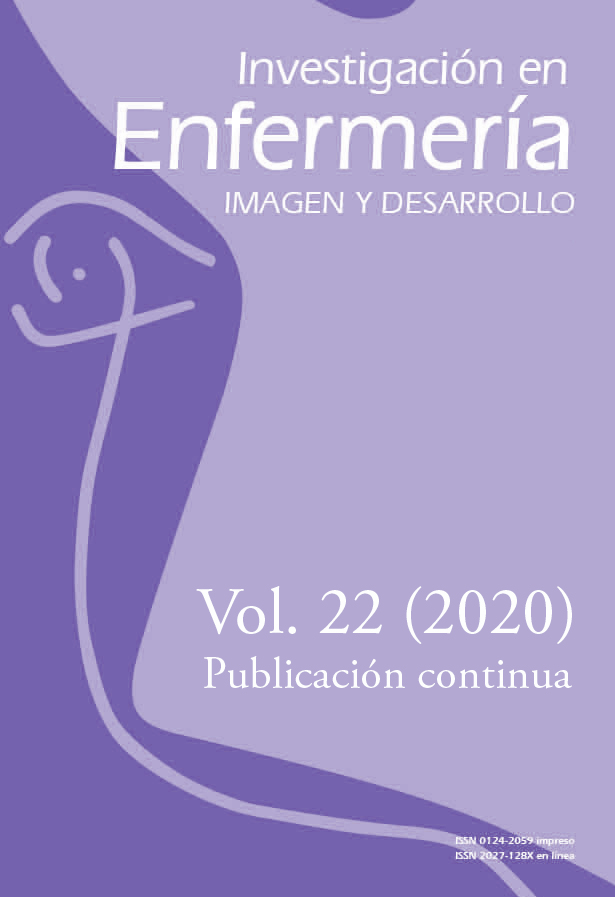Resumen
Introducción: la participación del padre en el trabajo de parto le abarca una serie de decisiones para actuar libremente según su experiencia durante el nacimiento. Así, la presencia y preparación de los padres durante el evento se hace necesaria para el bienestar de la diada; por tal motivo, la investigación tiene el objetivo de ampliar conceptualmente las necesidades de información que requieren los padres para su participación en el proceso de parto. Materiales y Métodos: estudio cualitativo descriptivo interpretativo bajo la técnica de análisis de contenido dirigido. Se realizaron entrevistas de profundidad a 30 participantes. En el proceso de análisis, codificación y categorización de la información realizaron con apoyo de Atlas Ti. Versión 6.2. Resultados y Conclusiones: los resultados ampliaron conceptualmente las necesidades de información de los padres, los cuales se describieron y agruparon en tres categorías establecidas previamente por la literatura: Información como necesidad de acompañamiento, información como necesidad de expresar sentimientos, entrenador “entrenado” para el parto. Los padres manifiestan varios sentimientos que generalmente se intensifican con el progreso del trabajo de parto, este estudio evidencia que entre ellos la incertidumbre y el temor, son eventualmente ocasionados por la falta de información y el desconocimiento. El significado a la información se relaciona directamente con el papel que pueden desempeñar dentro de la sala de parto, la cual les permite interpretar y comprender el proceso que atraviesa la mujer, por consiguiente, desenvolverse con confianza mientras se da el nacimiento.
Bond MJ. Paternal Involvement in Pregnancy Outcomes. Am J Mens Health [Internet]. 2013;4(4):285-28–6. https://doi.org/https://doi: 10.1177/1557988310384842
Vesga L, Ruiz C. Percepción que tienen las gestantes sobre el cuidado de enfermería en la atención prenatal. Investig Enferm Imagen Desarr [Interet]Investigación en Enfermería: Imagen y Desarrollo., 2019;21(1): 1-21, 2019. https://doi.org/10.11144/Javeriana.ie21-1.ptgc
Johansson M, Fenwick J, Premberg. A meta-synthesis of fathers’ experiences of their partner’s labour and the birth of their baby. Midwifery [Internet]. 2015;31(1):9-–18. Available from: https://doi.org/http://dx.doi.org/10.1016/j.midw.2014.05.005
Suto M, Takehara K, Yamane Y, Ota E. Effects of prenatal childbirth education for partners of pregnant women on paternal postnatal mental health: a systematic review and meta-analysis protocol. Suto. 2016; Syst Rev [Internet]. 2016;5(1):21. https://doi.orghttp://dx.doi.org/10.1186/s13643-016-0199-3
Markowska S, Porçba R, Krawczyk P, Skrzypulec V. The preferences of parturient women and the participation of the child’s father during birth. Neuroendocrinol Lett [Internet]. 2015;36(5):447-4–51. Disponible en: Available from: https://www.ncbi.nlm.nih.gov/pubmed/26707045
Organización Mundial de la Salud. Recomendaciones de la OMS para la conducción del trabajo de parto. OMS [Internet]. 2015;11-–43. Available fromDisponible en: http://www.who.int/topics/maternal_health/directrices_OMS_parto_es.pdf
Emelonye A, Pitkäaho T, Aregbesola A, Vehviläinen K. Women’s perceptions of spousal relevance in childbirth pain relief in four Nigerian hospitals. Sex Reprod Healthc [Internet]. 2017;12:128-1–32. https://doi.orghttp://dx.doi.org/10.1016/j.srhc.2017.04.004
Phuong T. Factors influencing intention of elective cesarean section among pregnant women in Quang Ngai province, Vietnam. Factors Influ Intent Elect cesarean Sect among pregnant women. Quang Ngai Prov Vietnam.; 2015; 38 (4): 137-151. Available fromDisponible en: https://he01.tcithaijo.org/index.php/nah/article/view/33599
Uribe T. Claudia, Contreras M. Aixa, Hoga L. Presencia activa del padre en el nacimiento integral: significados atribuidos por padres y madres a los roles paternos. Rev. Cchil. Oobstet. Gginecol. [Internet]. 2018 ; 83( 1 ): 22-26. https://doi.orghttp://dx.doi.org/10.4067/s0717-75262018000100022
Conesa- Ferrer MB, Canteras- Jordana M, Ballesteros- Meseguer C, Carrillo- García C, Martínez- Roche ME. Comparative study analysing women’s childbirth satisfaction and obstetric outcomes across two different models of maternity care. BMJ Open. 2016;6(8):e011362. https://doi.org/http://dx.doi.org/10.1136/bmjopen-2016-011362.
Lewis S, Lee A, Simkhada P. The role of husbands in maternal health and safe childbirth in rural Nepal: A qualitative study. BMC Pregnancy Childbirth [Internet]. 2015;15(1):1-–10. https://doi.org/http://dx.doi.org/10.1186/s12884-015-0599-8
Meier ME, Avillaneda L. A Literature Review of Paternal Involvement in Prenatal Care. 2015;15(1): 10. Available atDisponible en: http://digitalcommons.library.tmc.edu/jfs/vol15/iss1/10
Cáceres P. Análisis Cualitativo De Contenido: Una alternativa metodológica alcanzable. Psicoperspectivas. 2003;vol2(1) II:53-–82. http://dx.doi10.5027/psicoperspectivas-Vol2-Issue1-fulltext-3
Ministerio de Ssalud y Protección Ssocial. Resolución número 8430 de 1993. Bogota: Ministerio de Salud y Protección Social;1993 oct 4.;1993(Octubre 4):19.
Darwin Z, Galdas P, Hinchliff S, Littlewood E, McMillan D, McGowan L, et al. Fathers’ views and experiences of their own mental health during pregnancy and the first postnatal year: a qualitative interview study of men participating in the UK Born and Bred in Yorkshire (BaBY) cohort. BMC Pregnancy Childbirth [Internet]. 2017;17(1)45):45.. https://doi.org/http://dx.doi.org/10.1186/s12884-017-1229-4.
Braide ASG, Brilhante AV, Arruda CN, Mendonça FAC, Caldas JMP, Nations MK, et al. Sou homem e pai sim! (Re)construindo a identidade masculina a partir da participação no parto. Rev Panam Salud Púublica. 2018;42:e190. https://doi.org/10.26633/RPSP.2018.190
Baldwin S, Malone M, Sandall J, Bick D. A qualitative exploratory study of UK first-time fathers' experiences, mental health and wellbeing needs during their transition to fatherhood. BMJ Open. 2019 sSep. 13;9(9):e030792. https://doi.org/http://dx.doi.org/10.1136/bmjopen-2019-030792.
Baldwin S, Malone M, Sandall J, Bick D. Mental health and wellbeing during the transition to fatherhood: a systematic review of first time fathers' experiences. JBI Database System Rev Implement Rep. 2018 nNov.;v;16(11):2118-2191. https://doi.org/http://dx.doi.org/10.11124/JBISRIR-2017-003773.
Ballon- Aguilar YA,. Escalante Y,. Huerta MM. Relacióon enfermera-paciente según la teoríia de hildegard peplau en el servicio de centro quirurgico de un hospital nacional. año 2016. [tesis licenciatura]. [PerúLima]: Universidad Peruana Cayetano Heredia; 2016.
Galvis MA. Teorías y modelos de enfermería usados en la enfermería psiquiátrica. Rev Cuid [Internet]. 17 de julio de 2015 jul. 17;;6(2):1108-1120. https://doi.org/10.15649/cuidarte.v6i2.172
Meleis A. Transitions Theory: Middle Range and Situation Specific Theories in Nursing. New York: Springer Publishing Company; 2010. Chapter Cap. 1;. p. 11-38.

Esta obra está bajo una licencia internacional Creative Commons Atribución 4.0.
Derechos de autor 2021 Investigación en Enfermería: Imagen y Desarrollo


